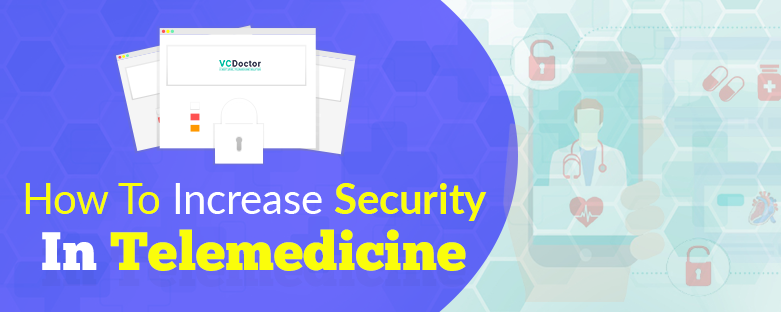How To Increase in Telemedicine Security
Patients and physicians switched from in-person visits to remote appointments, the coronavirus pandemic exacerbated telemedicine exponentially. In March and April, health services quickly expanded virtual offerings and traffic rates rose to unprecedented levels, with practices seeing 50 to 175 times the number of telehealth patients than before the outbreak. The number of hacking attempts also increases as telemedicine traffic increases. To know How to Increase Security in Telemedicine HIPAA compliance is needed if patient information is involved.
But the increase in the adoption of Telehealth App Development comes with a host of cyber security threats and regulatory criteria related to healthcare enforcement.
The Telemedicine HIPPA Security Rule Guidelines for medical professionals offering remote telehealth services to patients that have been developed by HIPAA. For healthy, reliable teleconsultation, offers a roadmap for medical professionals.
Acceptance by HIPAA of remote contact of electronically protected health information (ePHI). Many medical professionals think that since ePHI is just between the patient and the doctor in distance contact, they obey HIPAA guidelines. It is important to guarantee clear, safe contact between the patient and the doctor. It is extremely necessary, however, that the medium on which the communication is transmitted is also protected.
The Guidelines for HIPAA are as follows:
- Authorized users are the only persons that should be able to access ePHI, a fair precaution to avoid access to ePHI by unauthorized parties.
- Preventing malicious or unintended breaches requires the installation of an ePHI communication monitoring system. Mechanisms are implemented that can track and remotely remove ePHI data.
- Protecting the credibility of ePHI requires the introduction of a secure communication system. Insecure communication channels include Skype, email and SMS: none of these are suitable for remote communication of ePHI according to HIPAA.
What is Telemedicine?
Telemedicine is the distribution or transmission by telecommunication technologies of healthcare information as well as services. It enables testing, diagnosing, and treating patients in real-time without consulting the doctor in person. This pandemic situation actually needs something like telemedicine that offers people, seeking medical advice, a forum where they can directly communicate with doctors.
Telemedicine app development has started to transform the healthcare industry. Telemedicine software development is now the primary goal of healthcare organizations wishing to offer healthcare services to patients from a distance. When it comes to routine checkups or coping with patients who have trouble getting to their appointments either due to lack of transportation options or accessibility concerns, telemedicine software in India is a perfect solution. Telemedicine Software Development Companies treat patients without the physician meeting the patients in person.
How To prevent Security Risks in Telehealth?
Telemedicine security concerns can adversely affect people’s confidence in it and threaten the capacity of these programs to increase health care accessibility, quality, and effectiveness.
So here are some tips to avoid the risk of security in telehealth:
Protect Against Unauthorized Access:-
A vital method for online protection is the use of identity authentication systems. Many healthcare organizations use multi-factor authentication, which is estimated to block up to 99.9 per cent of all automated cyber-attacks, to protect against unauthorized access to sensitive data. This method enables users to log in only after two or more pieces of evidence verifying their identity is provided, thus greatly reducing the likelihood of violations.
Capturing or guessing passwords is a popular method hackers use to gain access to protected health information. Via identity verification and the use of strong passwords that are regularly changed to avoid password theft, this hazard can be minimized. Systems can after three unsuccessful attempts, lock users out of their accounts, and restrict user access to sensitive databases.
Audit Contracted Teleradiology Providers:-
In the case of radiology groups, ensure that adequate safety mechanisms are in place for transmitting patient information between offices while contracting with outside teleradiology companies for interpretations after the regular business hours of the facility.
Encrypt Data Storage:-
The last cyber-defence line for PHI and other sensitive information is data encryption. Even if attackers may infiltrate provider perimeter and diligent network protection and exfiltration data, if encrypted, those data is useless for hackers. When building volumes, it is good practice to encrypt both site and application servers operating on cloud instances using a key management service’s unique master key.
Encryption operations usually take place on servers that host cloud DB instances, maintaining both data-at-rest and data-in-transit security between an instance and its block storage. You may also choose to encrypt DB instances at rest, underlying DB instance storage, its automatic backups, and read replicas for additional safety.
Secure Your Endpoints:-
For healthcare organizations, endpoints such as laptops and tablets pose an enormous data risk. Although these technologies allow telemedicine service providers to be productive from any location, it is important that the data accessed from that device is secured and managed. Since this is healthcare, it is also important to ensure that all endpoint devices that are used to access PHI are compliant with HIPAA.
Investing in Education for Patient:-
Cyber security, outside of telehealth, ultimately depends on the end-user. Developers are in a relentless battle to keep up with emerging threats as hackers constantly exploit new vulnerabilities. Only as strong as its weakest link in cyber security. Other initiatives must accompany safe telehealth apps.
Conclusion:
We offer the Telemedicine Solutions For Healthcare Services in India especially in the USA and South Africa.
The field of telemedicine has introduced a lot of innovations that are helping physicians in delivering extreme care and extend their reach. If you need help with any kind of telemedicine software solution, VCDoctor has a list of perfect solutions for you that have helped various professionals in the field. Get in touch with our experts for more information.
- HIPAA Compliance Telemedicine Software
- Telemedicine App Development
- Telemedicine/Telehealth Integration
- EMR/EHR System Implementation
- Remote Health Monitoring System etc.




